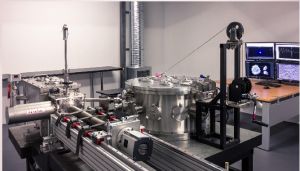“Soft x-ray microscopy (SXM) is an extremely exciting, potentially game changing technique that will allow us to visualise virally infected cells in exquisite detail,” said Assistant Professor Nicola Fletcher, UCD School of Veterinary Medicine. She added, “We will use it to investigate the mechanisms by which the hepatitis E virus, an emerging infectious disease that is transmitted to humans from infected animals, infects cells from different species. The ultimate aim is to explore new treatment options for this important viral infection.”
Dr Pablo Gastaminza, a Principal Investigator in the Department of Molecular and Cellular Biology at the Spanish National Research Council said, “We have successfully used the synchrotron-based cryo-SXM for visualising the alterations in cellular organelle morphology and distribution associated with the replication of hepatitis C virus in cell culture. A compact, lab-based microscope would simplify the sophisticated infrastructure while providing new opportunities for a broader use of cryo-SXM as a complementary approach to other microscopy techniques.”
Professor Ralf Bartenschlager, a Molecular Virologist at the Ruprecht-Karls-Universität Heidelberg commented, “as a virologist working on how SARS-CoV-2 interacts with and alters its host cell, we will greatly benefit from the development of a soft X-ray microscope that allows us to gain unprecedented insights into this intimate interaction. We have previously used several imaging technologies to address the question of host cell reprogramming by viruses, but each technique has its limitations.”
“SXM will provide an excellent tool for our studies of intranuclear interactions of oncolytic herpes simplex virus,” said Dr Maija Vihinen-Ranta, a Virologist and a Principal Investigator at the University of Jyväskylä. She added “Importantly, the correlative approach, where SXM is combined with fluorescent microscopy, can be used to incorporate the molecular localization of labeled data, e.g. chromatin, capsids, cellular proteins, into a 3D SXM reconstruction of an infected cell.”
Dr Eva Pereiro, a Principal Beamline Scientist, at the ALBA Synchrotron Light Source, stated “There are only a few cryo-SXT beamlines operating worldwide and therefore the access to the technique is quite restricted compared to other fields. Having laboratory systems which can deliver comparable results, although at a fixed energy, would allow the community to grow much faster and would enable the field to deliver better competitive science.”
“I find the potential of soft x-ray microscopy tremendous. It is like a medical CT scan but instead of a patient, single cells are imaged at the nanometer level,” said Dr Venera Weinhardt, a cell imaging expert from the Centre for Organismal Studies at the University of Heidelberg. She added “Project CoCID will help demonstrate the benefits of making this amazing technology available as a laboratory device, ubiquitous in all biomedical research laboratories.”
“This project award not only helps fund the advancement of our SXT-100 microscope”, said Tony McEnroe, CEO and co-founder of SiriusXT, “it also allows us to collaborate closely with European leaders in virology research to demonstrate the benefits of soft x-ray microscopy in progressing their understanding of pathogen infection pathways.”
CoCID is an EU Horizon 2020 funded project, awarded to Proposal 101017116 under call ICT-36-2020, an initiative of the Photonics Public Private Partnership (www.photonics21.org), which challenged applicants to develop advanced photonics technologies that have the potential to revolutionise an existing application sector or to create completely new applications and markets.






